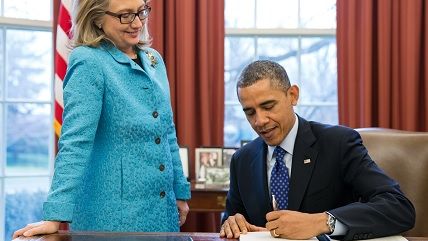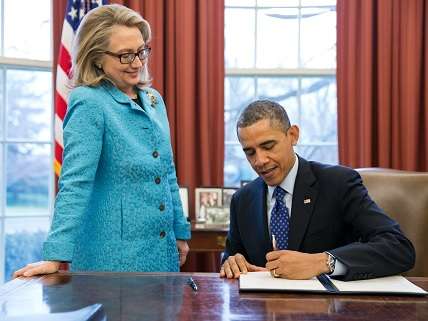Trump, Clinton Foreign Policy Nonsense a Reflection of the Obama Legacy


Tonight's presidential debate is unlikely to have much substance. It's nothing new—throughout the presidential election season, concerns over personality and character have trumped even the pretense of a focus on actual issues. Donald Trump's tenuous relationship with the truth makes this a particularly acute post-truth election but it isn't the first one. Neither is it the first post-issues election.
When it comes to foreign policy, it has been decades since there's been any kind of substantive domestic electoral debate. In the 2008 presidential election cycle, then Senator-Barack Obama got a lot of mileage out of his opposition to the Iraq War, when he was a state senator representing Hyde Park, one of the most liberal constituencies in Chicago. His primary opponent, then-Senator Hillary Clinton had not only voted for the 2002 authorization of the use of military force in Iraq but had also become one of its most vocal proponents, helping to forge a now conveniently forgotten bipartisan consensus.
But while Obama campaigned on his opposition to the Iraq War, which was by the 2008 election already slowly coming to an end. President Bush signed a status of forces agreement that called for a complete withdrawal of U.S. troops from Iraq by 2011 in December 2008. After taking office as president, Obama tried to get Iraq to agree to a residual force of 10,000 troops to remain in Iraq after the withdrawal date. By the 2012 election, he was running on the idea that he had brought the Iraq War to an end, even as in his first term he tried to negotiate an extension for U.S. troops in Iraq. His Republican opponent that year, Mitt Romney, tried to argue that keeping U.S. troops in Iraq past 2011 was vital, and that Obama did in fact try and fail to do that. The president largely denied the truth of the sequence of events wholesale.
In 2012, Obama was also campaigning on bringing the Afghanistan war to a responsible end. Today the U.S. war is in its 15th year, and is now a longer running conflict than the two world wars and the U.S. civil war combined. There was a long debated, quickly forgotten "surge" at the start of Obama's first presidency. The story of the Afghanistan war in Obama's first term was the story of bureaucratic infighting that pissed away any opportunity to bringing the Afghanistan war to a responsible end. Hillary Clinton, as secretary of state during Obama's first term, was a big part of that story and many other Obama-era foreign policy disasters. While the president's supporters touted the selection of Clinton as secretary of state as part of his effort to assemble a cabinet of "rivals" like Lincoln had done, what it had the effect of doing was erasing any kind of lesson that might have been learned about the folly of an interventionist U.S. foreign policy during the 2008 election cycle. "I don't want to have people who just agree with me," candidate Obama told Time magazine back then. "I want people who are continually pushing me out of my comfort zone."
How far outside the comfort zone interventionism ever was for Obama, who famously promised to go into Pakistan with or without the sovereign government's permission if it meant taking out Osama bin Laden, is debatable. Clinton's influence on Obama era interventionism isn't. Clinton was a major advocate of the U.S.-backed intervention in Libya, caught on camera laughing it up when Libyan rebels benefiting from U.S. air support captured Col. Qaddafi, the leader of Libya, and sexually assaulted and killed him. It shouldn't have been surprising—in her political career there has not been an interventionism that she's opposed or of which she's even been skeptical. Even President Obama admitted that failing to plan for the aftermath of the intervention in Libya was the "worst mistake" of his presidency. Hillary Clinton continues to defend it and says she has no regrets.
Meanwhile this election cycle, Donald Trump has tried to get mileage off his own purported opposition to the Iraq war, as a TV personality in the early 2000s. He's also claimed to have opposed the intervention in Libya, even as he made comments at the time that the U.S. had to take out Qaddafi to avoid appearing weak, saying such an operation would be "very easy and very quick." Incredibly, Trump has been embraced by a few non-interventionists even though he is far from one. While he has hit notes about the problem of the U.S. acting as a world policeman, this has most often been part of a world view where the U.S. continues to operate that way, with the substantive difference being getting paid for it, kind of the opposite of non-interventionism.
Neither Clinton nor Trump have offered a foreign policy vis a vis the Islamic State (ISIS) that differs from President Obama's own vague rhetoric about regional allies and military action. Neither has either one offered any kind of critique or commentary on the implications of America's broader interventionist foreign policy. More than 140 people may have been killed in an airstrike on a funeral in Yemen by the U.S.-backed Saudi coalition. That conflict has lasted a year and a half with no input from Congress or even any real public discussion. In response the White House said it would conduct an immediate review of its support for the conflict.
This resembles the White House's hand-wringing over the drone war it was waging across the Muslim world, which only became an issue for the White House after it could no longer be kept a secret. When Romney briefly looked like he could win the 2012 election, the White House worked on stricter rules for the use of drones. The effort didn't go far after the election. The U.S. is building a $100 million drone base in Niger while its counterterrorism efforts have exploded in West Africa. U.S. efforts from Nigeria to Afghanistan, the White House argues, when it bothers to argue, fall under the purview of the 2001 authorization of the use of military force against the perpetrators of 9/11 and "associated forces." Many of the alleged insurgents the U.S. is targeting aren't old enough to remember 9/11 let alone be responsible for it. Only one member of Congress voted against that authorization, Rep. Barbara Lee (D-Calif.), who also opposed the intervention in Libya. She is voting for Hillary Clinton, a perfect encapsulation of how Americans have foregone any attempt to engage what has become a bipartisan decades-long project of interventionism despite the occasional politically useful rhetoric against it.


Show Comments (122)